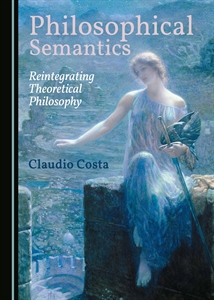ABOUT THE BOOK "PHILOSOPHICAL SEMANTICS"
The idea of writing a book called philosophical semantics I had more than 30 years ago, as I was writing a thesis on Wittgenstein in Germany. In the time, I was exasperated with Kripke’s brilliant but to a great extent implausible views and thinking that Ernst Tugendhat’s analysis of singular predicative statements was not only correct but able to be developed further. According to this analysis, the "sense" of a predicative singular sentence is given by its verification rule, which is applied by the application of the identification rule of the singular term to which is added the application rule of the general term, what constitutes correspondence...
Years later, I had some ideas to improve this view, I wrote some papers regarding aspects of the problem, but in the end, the original project was almost forgotten. In fact, I think some ideas remain unconscious, deciding the paths one follows. Thus, in the last 4 years, I wrote the book, which has now almost 500 pages, for me too, an unexpected, unparalleled work, a kind of patient addition of argumentative ``Darwinian`` accumulation of argumentative evidence.
Although the analysis of the singular statement forms the dorsal spine of the book, its scope is much wider. It begins with a methodological chapter showing why some kind of "Moorean" commonsensical intuitions should not be let down so easily, but normally seeing as points of departure able to be extended by science. This is followed by a "Tugendhatian" reconstructive examination of Wittgenstein’s and Frege’s semantic insights, together with a criticism of Kripke and the new orthodoxy that followed his work.
There is a chapter defending semantic verificationism, showing how wrong were the positivist and post-positivist philosophers in the criticism of their own distorted form of verificationism, different from Wittgenstein's original ideas.
After a renewed defense of an ontology of tropes that is incorporated in the book, after a renewed defense of a higher order view of existence (understood as the warranted applicability of conceptual rules), after an (in my view very convincing) defense of facts as truth-makers (showing why Strawson was wrong), and even after an answer to Hume’s problem of induction, the book ends with a full-blooded defense of the correspondence theory of truth that includes coherence as a mechanism to achieve correspondence and extends correspondence to formal sciences. Finally, the analysis of correspondence leads to the problem of perception and even of skepticism are dealt with.
The book is an attempt to reintegrate philosophy, challenging the present mainstream philosophy and the negative sides of the scientistic and fragmented ways philosophy it is presently made. If its ideas are correct, then to a great extent the present philosophy of language is misleading as a research program because the new formalist orthodoxy is scientistic in a reductionist way, failing to consider the issue from a broader perspective.
I think that the things told in the book are not difficult to see when people are looking from the right perspective and in the right way, since it is based on very plausible though often forgotten views. Hence, my job was to select, develop and associate these views in the right way, what in fact demanded to me (a poor, limited mind) some decades.
Since I am an outsider "aspie", living most of the time in Northeast of Brazil and without any chance of being published by great publishers (they refused even to evaluate a strange project written by an unknown researcher coming from nowhere...), I feel myself forced to do something against the possibility that this book disappears without any trace, covered by a mountain of academic writings. For this reason, I was glad to receive positive endorsements made by two German professors, Peter Stemmer and Wolfgang Spohn..
I am very thankful that they spent some time reading the book and I think they did it because the Germans still have an idea of what wide scope systematic philosophy should be.
As I was finishing the book, I was afraid I were ’’spinning’’. It is reassuring to know that if I am insane, I am at least in good company!
My last remark is about the strategy of the book. The first thing to be noted is that there are only a few ideas in the analytic philosophy that are prima facie plausible. Most of them, though sometimes very smart, creative and even relevant to other goals, seems to be more or less implausible. Now, assuming that the few prima facie plausible ideas are indeed the true ones, we can do the following. First, defend and develop them as far as we can. Second, try to see how they can be related to one another, to see how they fit together in the case they really fit together. Surprisingly, it was not very difficult to find these relations, what reinforced my assumption of "consilience". This was the strategy unconsciously applied to the construction of the book. The result was a systematic work with a very broad philosophical scope, whose surprising plausibility is based on its internal coherence. Of course, it was a speculative enterprise, but it seems to be essentially true. Even if the views were all wrong (I do not wish to dismiss any possibility), it would be interesting to understand why they seem to be true.


Nenhum comentário:
Postar um comentário